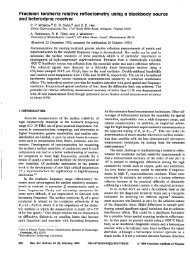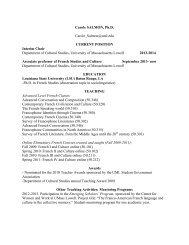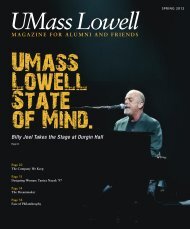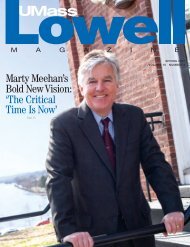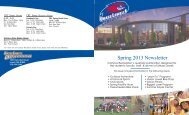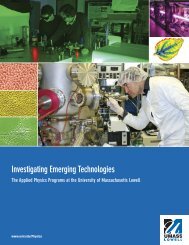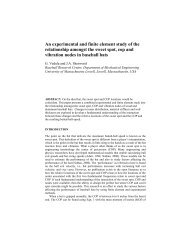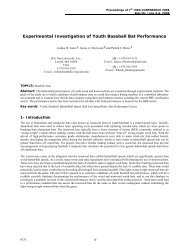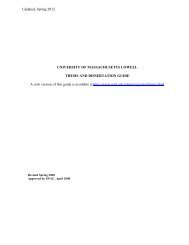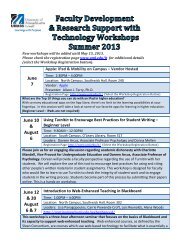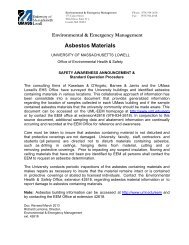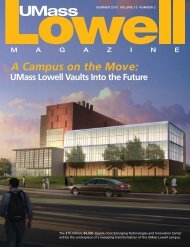comprehensive campus transportation plan - University of ...
comprehensive campus transportation plan - University of ...
comprehensive campus transportation plan - University of ...
You also want an ePaper? Increase the reach of your titles
YUMPU automatically turns print PDFs into web optimized ePapers that Google loves.
<strong>University</strong> <strong>of</strong> Massachusetts Lowell Campus Transportation Plan<br />
Because <strong>of</strong> the substantial overlap between parking and TDM, many<br />
parking-related recommendations have been presented already in the<br />
previous TDM Recommendations section (B). Different strategies are<br />
appropriate for resident students than for the general UMass Lowell<br />
commuting population, as distinguished in the following sets <strong>of</strong> summary<br />
recommendations:<br />
Key parking-related strategies for resident students<br />
••<br />
Reduce supply <strong>of</strong> parking available for resident students on <strong>campus</strong><br />
••<br />
Cap the number <strong>of</strong> resident parking permits at existing levels<br />
••<br />
Provide enough Zipcars for the resident students<br />
••<br />
Expand bike sharing (Freewheelers) program<br />
••<br />
Enhance walking and biking environment on and <strong>of</strong>f-<strong>campus</strong>, bike share<br />
••<br />
Provide weekend shuttle service to popular “out-<strong>of</strong>-town” entertainment/<br />
shopping locations such as Nashua, NH and the Burlington Mall<br />
Key parking-related strategies for commuters (faculty, staff and students)<br />
••<br />
Eliminate the ability to park in multiple locations in one day (park once<br />
policy)<br />
••<br />
Increase enforcement and “add teeth” to collection <strong>of</strong> parking violation<br />
fines<br />
••<br />
Assign parking locations (e.g., Freshmen to Pawtucket Blvd, Fall 2011)<br />
••<br />
Introduce parking permit priority for fuel-efficient vehicles<br />
••<br />
Provide incentives for car-pooling and van-pooling by preferential<br />
parking locations and/or pricing incentives<br />
••<br />
Provide for hourly paid parking options<br />
••<br />
Support parking management with a complementary package <strong>of</strong> TDM<br />
strategies to ensure realistic/attractive commuting options are available<br />
••<br />
Increase the cost <strong>of</strong> parking permits<br />
••<br />
Provide financial incentives for not commuting by SOV (parking permit<br />
buy-out program)<br />
D. Policy<br />
It is crucial for strong top-down leadership and policy to guide and support<br />
the implementation <strong>of</strong> the Plan’s recommended TDM and parking<br />
management strategies, and the <strong>plan</strong>ning and construction <strong>of</strong><br />
infrastructure improvements. The following sections provide a context for a<br />
sustainable <strong>transportation</strong> policy, an example <strong>of</strong> a <strong>transportation</strong><br />
sustainability policy from another public <strong>University</strong> system, and suggested<br />
actions for developing strong and lasting <strong>transportation</strong> policy at UMass<br />
Lowell.<br />
Commitment to Sustainability<br />
UMass Lowell has made a commitment to employ sustainable practices in<br />
its operations and to prepare its students to view the world through a<br />
sustainable lens. In 2007, UMass Lowell Chancellor, Marty Meehan, signed<br />
the American Colleges and <strong>University</strong> Presidential Climate Commitment<br />
(ACUPCC), a commitment to become carbon neutral as soon as possible<br />
and initiate tangible actions to reduce greenhouse gases in the interim. The<br />
<strong>University</strong> has made significant strides to bring sustainability to its<br />
educational <strong>of</strong>ferings though its educational centers (e.g., Lowell Center for<br />
Sustainable Production and Center for Sustainable Energy) and through<br />
efforts by the Environmental Health and Safety department. UMass Lowell<br />
recently updated its Climate Action Plan. Since student, faculty and staff<br />
commuting is one <strong>of</strong> the most significant contributors to the <strong>University</strong>’s<br />
carbon footprint , the Climate Action Plan is an excellent opportunity to<br />
develop and adopt sustainable <strong>transportation</strong> policies.<br />
60<br />
Vanasse Hangen Brustlin, Inc.



